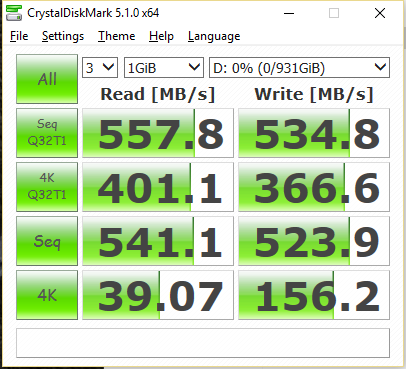CRYSTAL DISK BENCHMARK VER. 4.0.3 X64
Crystal Disk Benchmark is used to measure read and write performance through sampling of random data which is, for the most part, incompressible. Performance is virtually identical, regardless of data sample so we have included only that using random data samples.
V1

V2

Again, Crystal Disk Mark shows us very close overall results. Sequential read and write speeds are very good and 4K QD1 speeds are improved over the original. This is a great sight, something we like to see.
The toughest benchmark available for solid state drives is AS SSD as it relies solely on incompressible data samples when testing performance. For the most part, AS SSD tests can be considered the ‘worst case scenario’ in obtaining data transfer speeds and many enthusiasts like AS SSD for their needs. Transfer speeds are displayed on the left with IOPS results on the right.
V1



V2



Overall, the latest 850 EVO has a slightly higher AS SSD benchmark score reaching 1258 points. Sequential speeds are similar again and 4K speeds are also improved over the original. During the Copy benchmark we can see that across the board speeds are slightly slower, but still very close nonetheless.
ANVIL STORAGE UTILITIES PROFESSIONAL
Anvil’s Storage Utilities (ASU) are the most complete test bed available for the solid state drive today. The benchmark displays test results for, not only throughput but also, IOPS and Disk Access Times. Not only does it have a preset SSD benchmark, but also, it has included such things as endurance testing and threaded I/O read, write and mixed tests, all of which are very simple to understand and use in our benchmark testing.
V1

V2

Finally, during Anvil Storage Utilities we see another notable increase in performance. Sequential read and write speeds remain similar while 4K lower QD speeds show an improvement. Overall, so far so good with this new 850 EVO revision. Let’s move on to our PCMark and real world testing shall we?
 The SSD Review The Worlds Dedicated SSD Education and Review Resource |
The SSD Review The Worlds Dedicated SSD Education and Review Resource | 
Apart from the fewer nand packages, do you think the power consumption improvement could be attributed to the controller?
The controller package seems smaller on the newer version. Do you know if it’s a new revision, or just a shrink to a new smaller node? Probably the latter i suppose, although a new revision might be needed for the 4tb model.
Hi there,
Can anyone tell me where to purchase these new 48-layer V-NAND drives? I’ve looked on Amazon and it seems they are still selling the 32 – layer versions. Anyone got a link (specifically for the 1Tb model)??
Thanks in advance.
Versions can be seen from the revised packaging: Instead of the orange lettering “Powered by 3D V-NAND Technology” now adorns a “V-NAND” lettering with blue “V” on the box.
thats why sequential minimally regressed but random improved